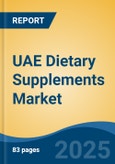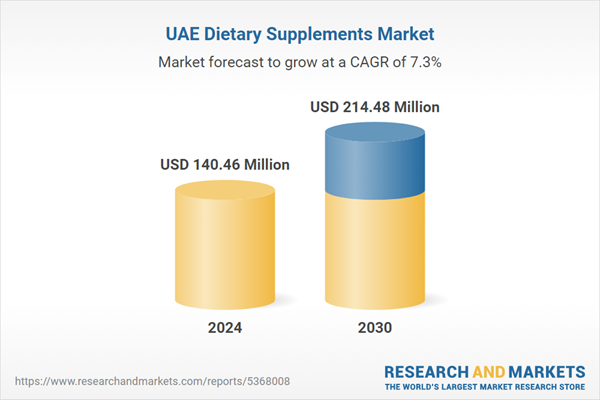Speak directly to the analyst to clarify any post sales queries you may have.
10% Free customizationThis report comes with 10% free customization, enabling you to add data that meets your specific business needs.
As individuals become more proactive about managing their health and well-being, there is a growing demand for dietary supplements to complement their diets and address specific health concerns. Lifestyle factors such as hectic schedules, stress, and inadequate nutrition contribute to the need for dietary supplements to bridge nutritional gaps and support overall health. Endorsements from healthcare professionals, celebrity influencers, and the availability of a diverse range of products further fuel market growth.
Key Market Drivers
Increasing Health Awareness
The UAE Dietary Supplements Market is propelled by a fundamental factor: the escalating awareness of health and wellness among consumers. This burgeoning consciousness stems from a collective recognition of the importance of maintaining optimal health and preventing potential health complications. With individuals increasingly prioritizing their well-being, there is a notable shift towards proactive health management strategies. This paradigmatic change encourages consumers to explore various avenues to augment their overall health, including the incorporation of dietary supplements into their daily routines.As consumers become more discerning about their health, they actively seek out solutions that align with their wellness objectives. Dietary supplements emerge as a viable option due to their accessibility, ease of use, and perceived benefits in supporting health goals. Whether aiming to boost immunity, improve energy levels, or address specific nutritional deficiencies, consumers perceive dietary supplements as convenient tools to enhance their overall well-being. The pervasive availability of information through various channels, including media, social networks, and health-related publications, contributes to the dissemination of knowledge regarding the role of dietary supplements in promoting health. Consumers are increasingly exposed to information highlighting the potential benefits of dietary supplements, fostering a deeper understanding of their utility and prompting greater interest in their adoption.
Key Market Challenges
Regulatory Compliance and Standards
One of the primary challenges in the UAE Dietary Supplements Market revolves around regulatory compliance and adherence to stringent standards. The market is governed by regulations set forth by regulatory bodies such as the Emirates Authority for Standardization and Metrology (ESMA) and the Ministry of Health and Prevention (MOHAP). Compliance with these regulations, including product registration, labeling requirements, and ingredient specifications, can pose challenges for manufacturers and distributors. Ensuring that dietary supplements meet the necessary regulatory requirements while maintaining product efficacy and quality standards requires substantial investments in compliance infrastructure and expertise.Key Market Trends
Expansion of Retail Channels
The proliferation of retail channels in the UAE, spanning pharmacies, supermarkets, health food stores, and online platforms, has significantly transformed the accessibility landscape of dietary supplements for consumers across the country. This expansion represents a pivotal development in the market dynamics, democratizing access to dietary supplements and empowering consumers with unprecedented choice and convenience. Pharmacies, long regarded as trusted sources of healthcare products and services, have emerged as key retail destinations for dietary supplements. With their widespread presence in urban centers and communities, pharmacies provide a convenient avenue for consumers to access a diverse range of dietary supplements under one roof. The presence of knowledgeable pharmacists facilitates informed decision-making, enabling consumers to seek guidance on product selection and usage.Supermarkets, renowned for their extensive product offerings and competitive pricing, have also emerged as prominent players in the dietary supplements market. The inclusion of dietary supplements alongside groceries and household essentials enhances the visibility and accessibility of these products, catering to the needs of consumers seeking convenience and variety during their shopping trips. Health food stores, specializing in natural and organic products, cater to the preferences of health-conscious consumers seeking premium-quality dietary supplements. These specialized outlets offer a curated selection of supplements tailored to specific health goals and dietary preferences, catering to niche segments of the market seeking alternative and holistic wellness solutions.
Key Market Players
- Bayer Middle East FZE
- Nestlé Middle East FZE
- New Country Healthcare LLC
- Abbott Laboratories S.A.
- Ultramade Nutrition and beverages Factory
- Quest Vitamins Middle East FZE
- MicroSynergy Pharmaceuticals FZCO
- Geltec Pharmacare FZCO
- Pharmatrade LLC
- Medysinal FZCO
Report Scope:
In this report, the UAE Dietary Supplements Market has been segmented into the following categories, in addition to the industry trends which have also been detailed below:UAE Dietary Supplements Market, By Product Type:
- Vitamin
- Combination Dietary Supplement
- Herbal Supplement
- Fish Oil & Omega Fatty Acid
- Protein
- Others
UAE Dietary Supplements Market, By Form:
- Tablets
- Capsules
- Powder
- Liquids
- Soft Gels
UAE Dietary Supplements Market, By Distribution Channel:
- Pharmacies and Drug Stores
- Supermarkets and Hypermarkets
- Online
- Others
UAE Dietary Supplements Market, By Application:
- Energy & Weight Management
- General Health
- Bone & Joint Health
- Immunity
- Others
UAE Dietary Supplements Market, By End User:
- Infants
- Children
- Adults
- Pregnant Females
- Geriatric
UAE Dietary Supplements Market, By Region:
- Abu Dhabi
- Dubai
- Sharjah
- Rest of UAE
Competitive Landscape
Company Profiles: Detailed analysis of the major companies present in the UAE Dietary Supplements Market.Available Customizations:
With the given market data, the publisher offers customizations according to a company's specific needs. The following customization options are available for the report.Company Information
- Detailed analysis and profiling of additional market players (up to five).
This product will be delivered within 1-3 business days.
Table of Contents
Companies Mentioned
- Bayer Middle East FZE
- Nestlé Middle East FZE
- New Country Healthcare LLC
- Abbott Laboratories S.A.
- Ultramade Nutrition and beverages Factory
- Quest Vitamins Middle East FZE
- MicroSynergy Pharmaceuticals FZCO
- Geltec Pharmacare FZCO
- Pharmatrade LLC
- Medysinal FZCO
Table Information
| Report Attribute | Details |
|---|---|
| No. of Pages | 83 |
| Published | July 2025 |
| Forecast Period | 2024 - 2030 |
| Estimated Market Value ( USD | $ 140.46 Million |
| Forecasted Market Value ( USD | $ 214.48 Million |
| Compound Annual Growth Rate | 7.2% |
| Regions Covered | United Arab Emirates |
| No. of Companies Mentioned | 10 |









